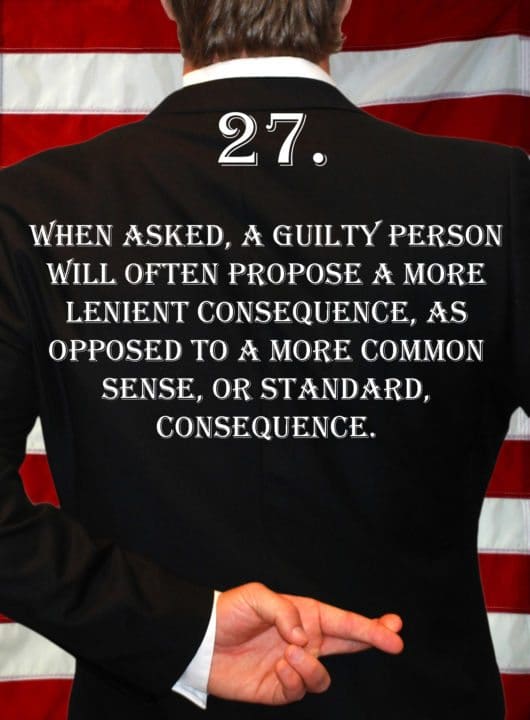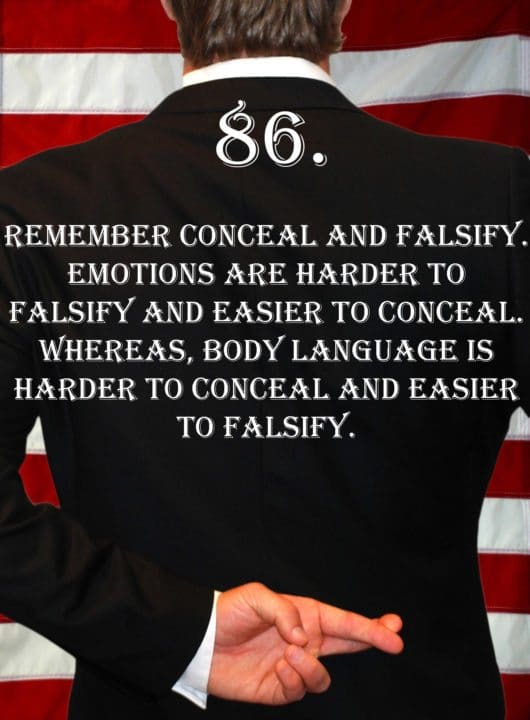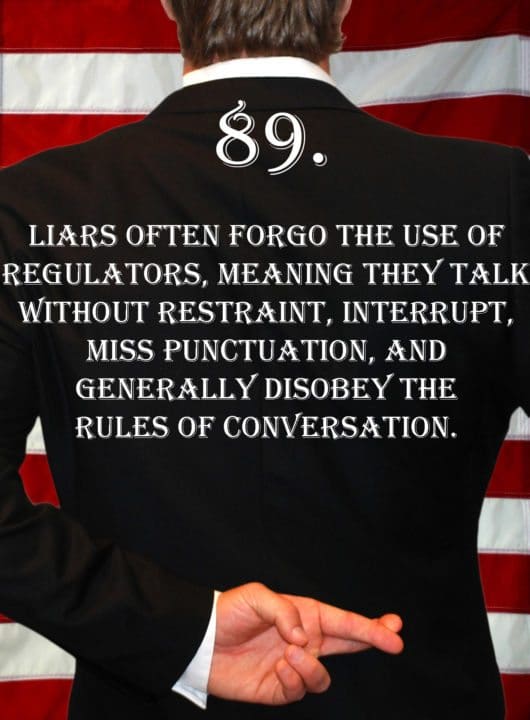
Deception Tip 27:
When asked, a guilty person will often propose a more lenient consequence, as opposed to a more common sense, or standard, consequence.
Listen To The Podcast!
E27 – Suggesting Consequences – Deception Tips Podcast – Click Here To Subscribe
Podcast Transcript
Hello and welcome to the deception tips podcast where you will learn amazing cues to detect deceit that will help you read people like never before. I’m your host Spencer Coffman, let’s get started.
Welcome to episode 27 of the deception tips podcast. I’m really happy you’re continuing to tune into these deception tips podcasts. Now, last time we spoke of a cool thing, it was a great deception tip.
It was a tactic, a kind of manipulation tactic that you can use once you have already somewhat determined that that person is lying. It’s kind of like a fail-safe. Once you think that you’ve caught them in a lie, then you can start to pull these other tactics out of your hat.
And these are more tools for you to use. Advanced techniques that you can use to confirm whether or not someone is lying. And not only to confirm whether or not they are lying but also to get them to own up to and fess up to the truth.
We said that often times you can accuse a liar of a greater crime to get them to fess up to the smaller crime. And by crime, I just mean something with a bigger consequence. So, you can use this anywhere, if you want to use it in your job, your sales, if you want to use it in politics, you can use it in law enforcement, with your kids, wherever the case may be.
Anytime you can accuse someone of something greater than what they may be lying about, then they will say, “now wait a minute, I didn’t do that. I may have done this but not that”, and that can really help you.
And it is really only effective if you already are fairly certain that they have lied about whatever is the lesser thing. Because if you’re not certain, then you’re just blowing smoke and you have really nothing to verify it with or nothing to fall back on. But if you are certain and then you use this, you can make sure that you can continue to prove it.
You still have some kindling to keep putting on that fire. You can accuse them of something greater and then if they don’t cooperate with you, you can say, “well wait a minute, when you said XYZ, I know that that wasn’t the case because this is what really happened” and then they really know, okay, wait a minute, they did catch me in that lie.
Then you can say “and when this happened, and I think this happened, and then I even suggested something, a little part of your story to corroborate it but, in fact, that was false. I made that up and gave it to you and you ran with it which means to me that it was entirely a lie”.
And now they can say, holy moly, that person has it all figured out. Their mind will be spinning, they’ll be sweating bullets at that point. They will definitely be very stressed, very tense.
So, the signs will continue to pick up, and then you can say, “so, now that we’ve established that, would you like to tell me why you did this?” And you can suggest that greater crime or something with a greater consequence.
And they can say, “all right, you got me. I did the other stuff, but I did not do that.” And then they would have confessed, and you can say, “no, I know you didn’t do that, that was another technique.”
Now, they’ll own up to the lesser stuff and you can start working with it to progress and finish out the interrogation or the questioning or whatever. And you can move forward at that point certain that they have lied.
Now they have owned up to it and you know the truth, so that is what that is, it is a great method. And if you combine it with the other methods such as suggesting answers and using different bits to put into their story, injecting things in there that they can run with.
And also, obviously, you need to be watching out for the signs of deception so that you know which parts of their story are true and which are false, and you know which are sensitive subjects or which things that you may need to come back to.
Because if you are asking about something and they’re telling a story and you notice that during a certain part of their story they do a certain body behavior, but you don’t want to interrupt their story because that is one of the most important things you need to stay silent.
And we talked about that a long time ago way back in episode 13. We talked about the importance of staying silent, you need to let the liar talk. So, if you notice that they do something or perform a certain behavior during their story, don’t interrupt them just jot it down and let them finish.
Then you can come back to that because you know that whatever they were talking about when they did that behavior that’s going to be something that you want to touch on again and you want to get back to.
So, now we have another sort of technique that you can use, and this goes hand-in-hand with what we talked about last week. So, this is a great technique you can use to get a liar to kind of, in essence, suggest their own consequences or proposed different sentencing or something like that to whatever crime they may have allegedly committed. And this can also help you to determine whether or not they may or may not have committed that offense or crime or whatever.
So, here it is, deception tip 27. When asked, a guilty person will often propose a more lenient consequence as opposed to a more common sense or standard consequence. Here it is again, deception tip 27. When asked a guilty person will often propose a more lenient consequence as opposed to a more common sense or a standard consequence.
So, what does this mean? Well, it’s very simple. Usually, you can use this with kids, it is a wonderful tool with kids. Usually, when asked, so for example, if you have someone who’s guilty or who isn’t guilty, but you’re interrogating them for whatever offense and you can say, “well, what would you do if you knew someone did XYZ, what would be your sentence? What would be your suggestion?”
And they might say, “well, I would give them XYZ or I would do this or 20 hours of community service, or maybe they should lose their TV privilege” or whatever the case may be. And a guilty person will often propose a little more lenient consequence because they know that they might be getting that consequence.
Whereas, an innocent person is going to give you what it should be. And we’re going to talk a lot more about this and a lot more about the different consequences and the different ways that you can use this coming up right after this.
Want to be an expert at detecting deception? Download the deception tips e-book and swipe through the pages while waiting in line, in the elevator or anywhere you have a few minutes to spare. Download it today at https://SpencerCoffman.com.
Guilty people, always want to get off the hook. Well, obviously because they know that they did something wrong and they are trying to lie to get out of it. So, not only did they do whatever they did, so they did one thing wrong, but now they’re lying about it.
So, normal people, feel bad about what they did and now they’re lying about it and they feel bad about lying about it as well. So, they feel bad twice plus they’re lying and that causes such a battle between the unconscious and the conscious.
The conscious is so deceitful and the unconscious is so truthful. So, they are just fighting in hand-to-hand combat, an intense battle of where the truth is and what is going to come out. Is the lie going to win or is the truth going to win? And so yes, they feel bad about doing the thing, they feel bad about lying and now there’s a huge battle between the conscious and unconscious.
So, there’s just a lot of tension and a lot of stress that is happening as a result of this. Therefore, when they are telling this lie, and if you are watching, you can see all of this leakage that comes out.
And you can start to notice, and you can start to put down little things like, okay, well when they said this, this happened, when they do this, this happens and then you can kind of poke those areas. You can probe back in and say, “hey, what about XYZ?”
And then you can say, well, there’s that sign again, so this must be a sensitive subject for them. And you can keep pushing, you can kind of add coals on to the little fire there and get it going.
It’s like pouring salt on a wound, you’re just going to kind of intensify what’s going on and then you’ll really get them to crack. And so, if you can start noticing that and then using these little techniques to push further, then they will really be tense and stressed out and pretty soon they will crack instantly. And that is a good thing because then you can get the truth.
So, part of this is when you have already suspected that they are lying. Maybe you have used the other techniques, especially the one from last week to get them to fess up to the crime by suggesting a stronger crime.
And if they have done that, now they’ve already confessed, so this one really isn’t going to help you too much, but it could still help you. But also, though, if they have already confessed to the crime, this technique may not work that well because they already know that you know that they did it.
So, if they have confessed to the crime and you say, “well, what do you think the consequence should be to that?” They may still give you a common-sense answer because they know that you know that they did it.
They have nothing to gain now by lying, so they may do that. So, in that case, this would be off. However, if you’re not certain and if they don’t know that you have found them out, you can say…
“hey, you did this, it was wrong. What do you think a consequence should be for someone who did this?” And they say, “well, wait a minute, I didn’t do it.” And you say, “okay. Well, what about someone else who may have done this? What do you think a typical consequence would be for this?
What about XYZ?” And they might say, “well, I think that anyone who steals something should have to pay it back and pay the money and give it back and nothing. Or they should have to do this or if you lied about doing your chores, well, maybe I can lose my phone for a day.” And they give lesser consequences than what should happen, then that’s a sign of guilt.
So, for example, if your son or daughter does something, they miss their curfew and come home late. And you say “well, did you come back on time last night?” And they say, “yes, of course, I did.” And you say, “okay, well, what do you think should happen if I were to find out that you didn’t come back on time?”
They may say something like, “well, maybe I could get a warning” and you say “well, how about if I find out you don’t come back on time, you have an earlier curfew?” And they might say, “well that’s not fair, that’s terrible.” But that would be the logical thing.
If they can’t come back on time, maybe something else needs to happen. Maybe they need an earlier curfew for a little while. Maybe they shouldn’t even go out at all if they can’t follow the rules. But they wouldn’t suggest that because that is a normal common-sense type answer.
They may say something very light or, “what happens if I find out you’re on your phone past ten o’clock when you’re in your room?” “Well, maybe I would just shut it off or maybe you could knock on the door” or something light like that.
And you say “well, how about I just have you turn your phone and every night?” They may not like that. They wouldn’t suggest something that is a common-sense type of answer. So, keep that in mind, you need to have in your mind what a typical response would be.
You’re asking, you’re soliciting, for a response, you’re fishing here. You’re asking them for their opinion on a matter, so you need to know what the proper response is.
If you have no idea, then you’re not going to have anything to compare it with and you just won’t help you at all, you won’t be able to tell anything. So, you need to make sure that whatever scenario you give them, you have a baseline to go with.
So, for example, if you know that the typical punishment for theft is a fine of $200 and XYZ and you suggest, “hey, well, what do you think it should be?” And they say, “well, how about I just give back the merchandise?”
“Okay. Well, that doesn’t make any sense. I mean obviously, you’re going to give it back but not only are you going to give it back, but you’re also going to pay a fine and you’re going to do XYZ or something.”
So, that is one thing to keep in mind whatever scenario you propose, you need to know exactly what the proper response is. Because you have to know what they’re going to tell you.
And if they tell you something along the lines of the proper response, now you know, well, that was a good response, that’s probably what I would do and then you can move on. Now you know, well, maybe they’re not guilty or you know that that was just the wrong alley and now you need to continue on something else.
It’s like anything, anything relating to body language, there is never one specific answer, there’s never one specific thing. It’s a variety of factors, it’s a cluster, a pattern of behaviors.
So, you cannot just use this and expect that it will be the failsafe and the truth every time, it may not work every time. Especially if you don’t know what the proper response is, then it won’t work at all, but it won’t work every time, period.
Just like what we talked about last week, accusing a liar of a more serious crime, may not work every time. Maybe they don’t care. Maybe they know that they didn’t do either so they’re not going to fess up to anything. It might not work every single time.
However, if you pay attention to all of the signs, to all of the behavioral patterns and you come back to things like when they’re telling their story if you notice something you write it down and you come back to it later, and poor little gasoline on that fire and get it going, that will help you.
You need to remember that there will always be more than one sign. Liars, as long as they’re lying, will continue to leak behavioral science. Because like we’ve talked about so many times before, there is such a battle between the conscious and the unconscious. They are fighting head to head, they cannot help it. The unconscious will continually leak truthful nonverbal signs of deception.
So, that with the hopes that someone will see them and call out and catch that unconscious. It’s like the mischievous brother or something that is trying to get the other one in trouble.
But in this case, it’s kind of the other way around it’s the justice and righteousness trying to get it to prevail so that Justice always prevails. That’s the case here. So, as long as you continue to pay attention, there will be more than one sign for you to see.
I want to thank you for listening to this week’s episode of the deception tips podcast and I encourage you to share it with your friends, subscribe to the feed, watch the body language videos, check out the deception tips blog, take a look at the books I have available and as always tune in next week for a new deception tip.
Video Transcript
Hey guys, my name is Spencer Coffman, thank you for watching the deception tips videos. They’re all about teaching you how to read people and detect deception so that you will be able to tell if someone is lying to you.
Today, we’re going to kind of tie into what we talked about last time, about suggesting things or getting some feedback. It is a strategy that you can use to determine whether or not someone is being truthful or not.
Now this one, instead of suggesting a potential consequence or suggesting a potential thing or accusing them of something greater to get them to admit to something this has to do with allowing them to dictate the outcome of whatever is happening.
So, for example, if you have kids, if they’ve done something and you say well what do you think the punishment should be or what do you think this should be? For law enforcement when they’re interrogating people they would maybe ask them well what do you think the typical sentence would be for this sort of crime?
You would get two different responses, you would get multiple different responses depending on the situation but you’re going to get two categories of responses depending on whatever the outcome is whether they are telling the truth or whether they are telling a lie. So, here it is this is deception tip number 27 when asked, a guilty person will often propose a more lenient consequence as opposed to a more common sense or standard consequence.
So, there are two parts to this, you get two categories of answers. So, if I ask what you think should be the consequence for this sort of behavior, at this point in time you are already fairly certain that this person is lying. They may even already be caught but they haven’t fully confessed or admitted to it and you may use this to kind of clinch the deal or become a hundred percent certain, it’s kind of confirming your belief.
So, you’ll say to them, well what do you think a typical consequence or what should be the sentence or what should happen if someone were to do this? You don’t have to say for them, you proposed it in a more general sentence. So, if you say, well what about when someone steals, what do you think should be the consequence for them? You could even come up with a fake scenario, well there’s another person we have that we’re trying to figure out how to punish them and this is their scenario, what do you think would apply or what do you think would be fair?
You know fully well that the scenario is very similar to the one that this person is in but you’ve made up a different one or you maybe have a real life different one. Either way, you’re giving them the chance to determine whether or not or what the outcome or what the consequence is of a sentence or of a situation that is very similar to theirs. So, they will be open to giving you that information because they know it’s not applying to them but in the same way they also know that it kind of does apply to them it’s unconscious.
They consciously know that you’re not accusing them of doing it, but they unconsciously know that it’s the same as their situation, so a liar will propose a more lenient consequence. So, for example, well what do you think the sentence should be for larceny or grand larceny or some big-time theft, bank robbery. And they may say well maybe five years in prison or something or maybe a year in prison or something ridiculous.
If you’re going 200 miles an hour what do you think should be the consequence and they said, well maybe a couple hundred dollar fine, are you kidding me? It’s something that’s going to be out of the question. Whereas, a truthful person who maybe didn’t do that, they would propose something like well grand larceny man they should be locked up for 25 years or something like that.
Or, if you’re going 200 miles an hour, that’s pretty high over the speed limit maybe you’d lose your license, maybe for a suspension or maybe permanent or whatever the case may be, it’s going to be a more common sense or standard response. So, this is a great technique that you can use when you want to know if someone is lying or if someone is telling the truth.
If this is your first time watching these videos, I’d love to have you subscribe to the channel on YouTube. We have a lot of information there and you can also leave comments if you have any questions, we also have stuff available on spencercoffman.com, books, podcasts, blog posts, etc. all available to teach you exactly what everybody is saying.
Until next time.






